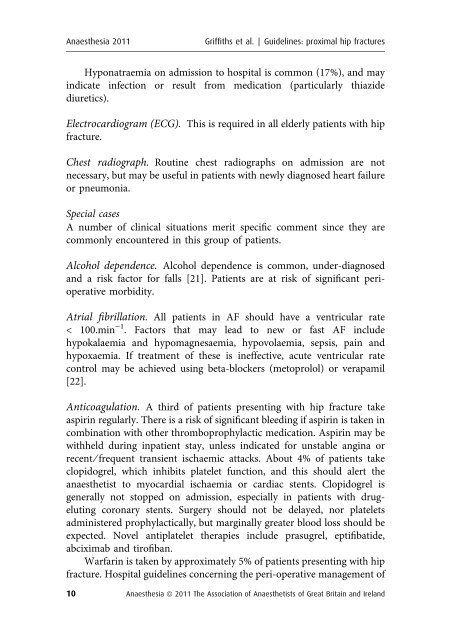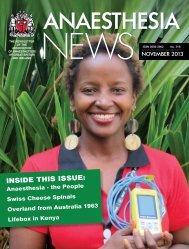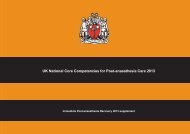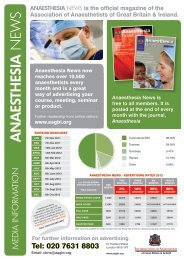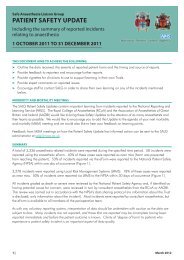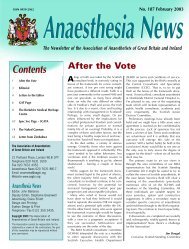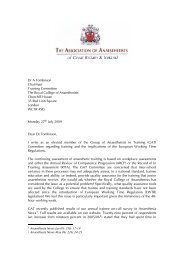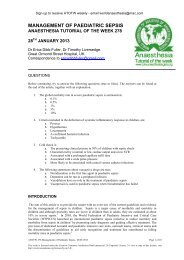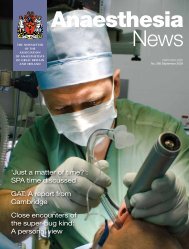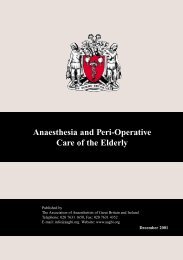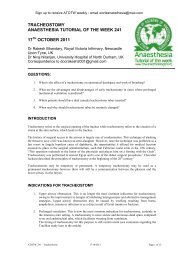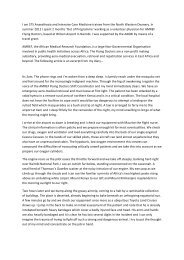Management of Proximal Femoral Fractures 2011 - aagbi
Management of Proximal Femoral Fractures 2011 - aagbi
Management of Proximal Femoral Fractures 2011 - aagbi
Create successful ePaper yourself
Turn your PDF publications into a flip-book with our unique Google optimized e-Paper software.
Anaesthesia <strong>2011</strong>Griffiths et al. | Guidelines: proximal hip fracturesHyponatraemia on admission to hospital is common (17%), and mayindicate infection or result from medication (particularly thiazidediuretics).Electrocardiogram (ECG). This is required in all elderly patients with hipfracture.Chest radiograph. Routine chest radiographs on admission are notnecessary, but may be useful in patients with newly diagnosed heart failureor pneumonia.Special casesA number <strong>of</strong> clinical situations merit specific comment since they arecommonly encountered in this group <strong>of</strong> patients.Alcohol dependence. Alcohol dependence is common, under-diagnosedand a risk factor for falls [21]. Patients are at risk <strong>of</strong> significant perioperativemorbidity.Atrial fibrillation. All patients in AF should have a ventricular rate< 100.min )1 . Factors that may lead to new or fast AF includehypokalaemia and hypomagnesaemia, hypovolaemia, sepsis, pain andhypoxaemia. If treatment <strong>of</strong> these is ineffective, acute ventricular ratecontrol may be achieved using beta-blockers (metoprolol) or verapamil[22].Anticoagulation. A third <strong>of</strong> patients presenting with hip fracture takeaspirin regularly. There is a risk <strong>of</strong> significant bleeding if aspirin is taken incombination with other thromboprophylactic medication. Aspirin may bewithheld during inpatient stay, unless indicated for unstable angina orrecent ⁄ frequent transient ischaemic attacks. About 4% <strong>of</strong> patients takeclopidogrel, which inhibits platelet function, and this should alert theanaesthetist to myocardial ischaemia or cardiac stents. Clopidogrel isgenerally not stopped on admission, especially in patients with drugelutingcoronary stents. Surgery should not be delayed, nor plateletsadministered prophylactically, but marginally greater blood loss should beexpected. Novel antiplatelet therapies include prasugrel, eptifibatide,abciximab and tir<strong>of</strong>iban.Warfarin is taken by approximately 5% <strong>of</strong> patients presenting with hipfracture. Hospital guidelines concerning the peri-operative management <strong>of</strong>10 Anaesthesia ª <strong>2011</strong> The Association <strong>of</strong> Anaesthetists <strong>of</strong> Great Britain and Ireland


